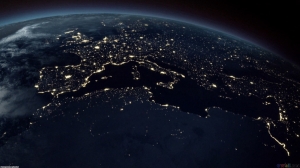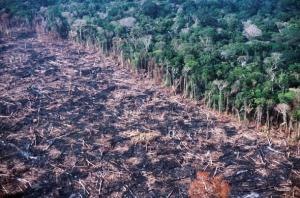by Enrique Lescure
An issue of waste. An issue of space.
Oftenmost when mainstream organisations are dealing with environmental concerns, they are focusing their attention on one particular issue close to the heart of that very organisation. It could be conservation, energy, emissions or rainforests. However, despite their best efforts to counter the trend, the usage of the planet’s biosphere has increased for every passing year – as evidenced by the Earth Overshoot Day that for every year is moving backwards throughout the weeks and months.
Some people believe that the current system in itself is fundamentally good, though they also believe that it has caused some problems. They do however believe that these problems can be managed within the exponential growth system, and that the problems themselves are mainly caused by insufficient technology.
Wind, solar, geothermal will put an end to oil dependency, and we will continue to have the current socio-economic system, and growth will continue so everyone will continue to have it much better in the future as GDP per capita will increase (now we for a moment ignore that real wages amongst the US middle and working classes have not increased since the late 1970’s). That is the mantra of the mainstream.
The way of the EOS is not to say no to optimism, but to say no to illusions. This is why we must poke a hole in this illusion.
Exponential growth on a confined space such as a planet will not – under any circumstances involving real biospheres – ever be able to sustain itself for eternity. Either it will be stopped by a stagnation of demand (as happened during the 1920’s), or by the very limits of the planet itself.
Proponents of the system then claim that when resources turn too expensive, humanity will – through the creative processes of capitalism – automatically find alternatives that are both cheaper and cleaner and offer a higher standard of life to the consumers and better profits to businesses.
The issue of space
Of course, they have it partially right. The world is not a zero sum game, and it is possible to find more efficient ways of doing things through technology. But technology in itself is most often not a problem. What is problematic, however, is the idea that the Earth is just a sum of resources, which has been the basis of Economics since the 18th century.
What they tend to ignore however, is the issue of ecology. The biosphere consists of tens of thousands of complex eco-systems, consisting of millions of animal-, plant- and fungi species. These eco-systems are more or less stable webs of life that interacts through interdependent relationships.
What tends to be forgotten is that we do not only take things from nature. We are also transforming nature, by turning areas into production zones for food and raw materials. One last point before we move along, is that proponents of the current system often refer to the Coase theorem, an economic theorem formulated by Ronald Coase, who basically sums up that the environment first deteriorates during early stages of economic growth, to recover later because the public has increased their income so much that they demand a better public environment (it can also be summed up as that well-defined property rights can regulate any problems). In short, to heal you first have to wreck.
These proponents often cite the well-known facts that Europe and North America today have more forests than they had a 100 years ago, to show that this law holds and that it is general. Given that, how then come that even if we use up less of our forests in the developed world today, our global footprints are increasing?
Simple.
We are simply shifting more of the logging to the developing world, especially the rainforests of Africa, South America and South-east Asia – some of the most biologically diverse places on Earth.
Linear resource flows
A mere 200 years ago, most economies were local village and town economies where most things utilised by humans within a confined area also were produced within that area. Today, even relatively simple items such as drawing pins are often consisting of substances that are extracted wherever it is cheapest and most effective to do so from a profit perspective.
Modern mega-cities are existing because they extract their resources from the entire Earth. The organic direction that this endeavour takes is characterised by what I call linear extraction systems. Such systems are characterised by the reformation of space into monocultural production zones, which de-facto are an industrialisation of nature. Such production zones are necessitating the destruction of the natural eco-systems previously located within the very same space.
In short, you must wreck to make.
Of course, all types of human activity will affect the environment, but the current system in employment in itself is based around production models that seek rationalisation above everything else. What means with rationalisation is the transformation of space and resources to best suit the profit demands of the market.
The effects of this can be seen throughout the world.
Moo!
If we for a moment place ourselves outside of Earth and outside of time, we can see that while there has been human cultures and tribes that have been carnivorous, most humans prior to the modern age lived on a largely vegetabilic diet – out of pure necessity. Meat requires animals to be grown up, and animals eat food.
However, with rising living standards, first in the west and later in the non-western world, new technologies and the rise of an increasingly urban middle class has led to a rise in meat consumption. Moreover, meat – at least for the generations who first had access to refrigerators – symbolised an increased social status and prosperity.
Apart from refrigerator technology and increasing abilities to preserve and transport meat, the 20th century has also seen the birth of a meat industry, which often is completely inhumane, dependent on steroid feeding animals and denying them the opportunity to pursue their natural behaviour. However, this industry is also contributing immensely to the destruction of the planet.
A large part of the meat industry is consisting of cattle and sheep, two hoofed animal species with similar digestive systems. This digestive system is very good at producing methane emissions, which contributes immensely to climate change. Methane for the record is a more potent gas than carbon dioxide.
Moreover, cattle demands much nutrients to grow, as well as much water. This means that the world’s 1,5 billion cattle is a high resource cost in terms of both space and actual emissions. Around a third of the world’s land surface is needed to feed the current population of cattle and sheep. Moreover, this has a direct impact on soil erosion and freshwater depletion. To not speak of greenhouse gas emissions. It is measured by a recent report by World Watch that this industry alone stands for 51% of the total emissions, meaning that it is the major contributor.
The solution
The film Cowspiracy recommends everyone to become vegetarians/vegans, which would solve the demand issue. The problem with that solution however is that it would not account for the lands already being damaged by the demands of the meat industry, and that it doesn’t take into account that not all people have the opportunity to arrange their consumption after environmental/vegan demands (even though that could change if more people became vegans since that would make vegan food commercially viable).
What we have seen is that we have an economic system which unintentionally punishes good behaviour and rewards bad behaviour in terms of sustainability.
The solution must then be to form a better form of market which would better reflect the needs for a holistic approach to the planet, especially where the cost of products would be measured against their ecological impact. The EOS has proposed such a model, called Energy Accounting. Under such a model, the cost of obtaining food would resemble the ecological impact of that particular food production model, which would pennalise for example the consumption of beef, as well as production that is not ecological.
What needs to be done globally however, is that we need a global accessment on how to minimise the amount of space we use to produce food on, so to give these areas back to the eco-systems which need to fill them so this planet should have a functioning biosphere.
This would require a mobilization of forces on all levels, from grassroots to global associations, in order to consciously steer our civilization towards food sustainability. EOS has worked on this together with Green Free Will on a local basis in northern Sweden, through the Umea Biodome Project. However, we need such initiatives in every city in every country on Earth.
It is a matter of the survival of the human civilization after all.






Leave a comment